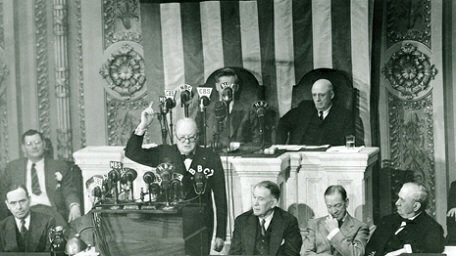On the anniversary of his birth, Constitution Daily looks back at what the British leader and author Sir Winston Churchill had to say about the American Constitution, which was quite a lot.
 After all, although Churchill came from a prominent British family on his father’s side, his mother was an American, Jennie Jerome. He was a British citizen, but in 1963, Churchill was the first person even honored by the United States Congress and President as an honorary American citizen.
After all, although Churchill came from a prominent British family on his father’s side, his mother was an American, Jennie Jerome. He was a British citizen, but in 1963, Churchill was the first person even honored by the United States Congress and President as an honorary American citizen.
In 1965, former President Dwight Eisenhower recalled a past conversation with Churchill when he spoke about his American heritage. “My mother was American and my ancestors were officers in Washington’s army, I am myself an English-speaking union,” Churchill reportedly said.
Churchill drove his point home on Dec. 26, 1941, when he spoke in Washington, D.C. to a joint session of Congress and the Supreme Court just weeks after the Pearl Harbor attack. "If my father had been an American, and my mother British, instead of the other way around, I might have gotten here on my own. In that case, this would not have been the first time you would have heard my voice,” he told a global audience.
“I have been in full harmony all my life with the tides which have flowed on both sides of the Atlantic against privilege and monopoly and I have steered confidently towards the Gettysburg ideal of government of the people, by the people, for the people,” Churchill added.
Five years earlier, Churchill wrote an article called “What Good’s A Constitution” for Collier’s magazine where he criticized some of President Roosevelt’s policies but praised America’s Constitution, and offered conflicting opinions on the struggle between Roosevelt and the Supreme Court. But here, many of his other comments dealt with the Constitution’s founding principles.
“No one can think clearly or sensibly about this vast and burning topic without in the first instance making up his mind upon the fundamental issue. Does he value the State above the citizen, or the citizen above the State? Does a government exist for the individual, or do individuals exist for the government?” Churchill asked.
“I hold that governments are meant to be, and must remain, the servants of the citizens; that states and federations only come into existence and can only by justified by preserving the ‘life, liberty and the pursuit of happiness’ in the homes and families of individuals,” Churchill implored.
“I judge the civilization of any community by simple tests. What is the degree of freedom possessed by the citizen or subject? Can he think, speak and act freely under well-established, well-known laws? Can he criticize the executive government? Can he sue the State if it has infringed his rights? Are there also great processes for changing the law to meet new conditions?” Churchill wrote. “Judging by these standards, Great Britain and the United States can claim to be in the forefront of civilized communities.”
Also, in his History of the English-Speaking Peoples, Churchill wrote at length about American constitutional values.
“At first sight this authoritative document presents a sharp contrast with the store of traditions and precedents that make up the unwritten Constitution of Britain. Yet behind it lay no revolutionary theory. It was based not upon the challenging writings of the French philosophers who were soon to set Europe ablaze, but an Old English doctrine, freshly formulated to meet an urgent American need. The Constitution was a reaffirmation of faith in the principles painfully evolved over the centuries by the English-speaking peoples,” he wrote.
Churchill scholars do point out that the former Prime Minister believed that Britain’s longstanding unwritten constitution was “a cut ahead” its American cousin, because he was concerned that the written American Constitution could be too rigid.
“A written constitution carries with it the danger of a cramping rigidity. What body of men, however far-sighted, can lay down precepts in advance for settling the problems of future generations?" he asked, in some ways foreseeing our current debate over originalism versus a living Constitution.
But Churchill also had faith that the amendment process would make sure any changes “would follow the guiding idea of the Founding Fathers.”
“A prime object of the Constitution was to be conservative; it was to guard the principles and machinery of state from capricious and ill-considers alteration. In its fundamental doctrine, the American people acquired an institution which was to command the same respect and loyalty as in England are given to Parliament and the Crown.”
In 1953, Churchill told an audience back in England at Westminster, including the commonwealth's new Queen, that the English needed to still strive to provide constitutional protections. "We must be very careful nowadays - I perhaps all the more because of my American forbears - in what we say about the American Constitution. I will therefore content myself with the observation that no better Constitution was ever better written in English."
"Both here and across the ocean, over the generations and the centuries the idea of the division of power has lain at the root of our development. We do not want to live under a system dominated either by one man or one theme."







